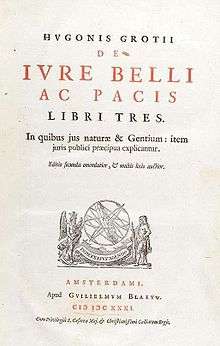De jure belli ac pacis

De jure belli ac pacis (English: On the Law of War and Peace) is a 1625 book in Latin, written by Hugo Grotius and published in Paris, on the legal status of war.[1] It is now regarded as a foundational work in international law.[2]
Content
Its content owed much to Spanish theologians of the previous century, particularly Francisco de Vitoria and Francisco Suarez, working in the Catholic tradition of natural law.[3]
Grotius began writing the work while in prison in the Netherlands. He completed it in 1623, at Senlis, in the company of Dirck Graswinckel.[4]
According to Pieter Geyl:
It is an attempt by a theologically and classically educated jurist to base upon law order and security in the community of states as well as in the national society in which he had grown up. In the rather naïve rationalism, the belief in reason as the lord of life, is revealed the spiritual son of Erasmus.[5]
In particular, this work is remembered for the Latin sentence:
Et haec quidem quae iam diximus, locum aliquem haberent etiamsi daremus, quod sine summo scelere dari nequit, non esse Deum, aut non curari ab eo negotia humana[6]
What we have been saying would have a degree of validity even if we should concede that which cannot be conceded without the utmost wickedness: that there is no God, or that the affairs of men are of no concern to Him.[7]
Such a concept has been synthesized with the famous Latin phrase etsi deus non daretur,[8][9] which means "even if God did not exist" but is normally translated "as if God did not exist".
References
- ↑ Hugonis Grotii, De Jure Belli ac Pacis, libri tres, In quibus ius naturae & Gentium: item iuris publici preciptae expilicantur, Pariisis: Apud Nicalaum Buon, M DC XXV, cum privilegio regis via Gallica (the French National Library)
- ↑ http://www.library.usyd.edu.au/libraries/rare/modernity/grotius.html
- ↑ Mark W. Janis, Religion and International Law (1999), p. 121.
- ↑ Jonathan Israel, The Dutch Republic (1995), p. 483.
- ↑ Pieter Geyl, History of the Dutch-Speaking Peoples 1555-1648 (2001 English edition), p. 502.
- ↑ Grotius, Hugo (2005). "Prolegomena 11". In Molhuysen, Philip Christiaan. Hugonis Grotii. De iure belli ac pacis. Libri tres, in quibus ius naturae et gentium, item iuris publici praecipua explicantur: cum annotatis auctoris (in Latin). Clark, New Jersey: The Lawbook Exchange, Ltd. ISBN 1-584-77539-4; ISBN 978-15-8477-539-3.
- ↑ Neff, Stephen C., ed. (2012). "Prologue". Hugo Grotius. On the Law of War and Peace. Student Edition. Cambridge: Cambridge University Press. ISBN 0-521-12812-9; ISBN 978-05-2112-812-4.
- ↑ See occurrences on Google Books.
- ↑ Beck, Richard (8 December 2010), Dietrich Bonhoeffer: etsi deus non daretur. Retrieved 8 July 2013.
Further reading
- Cornelis van Vollenhoven, On the Genesis of De Iure Belli ac Pacis
External links
- Online text (English text, abridged, PDF)
- Online text (English text, abridged, HTML and TXT)
- Online Text (English text, unabridged, HTML)